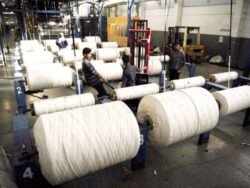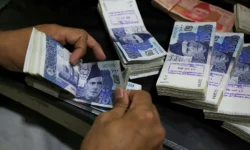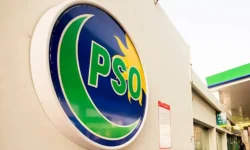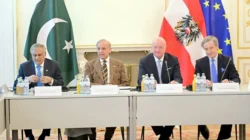INTERNATIONAL COMMUNITY’S CONFIDENCE IN PAKISTAN’S DIVERSE ECONOMIC SECTORS

Demonstrators wave flags during a protest march for government reform led by Pakistani preacher Tahir-ul-Qadri, in Islamabad, Pakistan, Jan. 14, 2013. Qadri, who has recently returned to Pakistan after living in Canada, has taken the country by storm in recent weeks in a campaign against government corruption that has gripped the news media and jolted the traditional political mainstream. (Diego Ibarra Sanchez/The New York Times)
Taimoor Mustafa
Pakistan has experienced a challenging period of economic regression, largely attributed to the hurried and poorly planned decisions and short term economic policies. However, recently Pakistan’s economy is gaining momentum and attracting the attention of the international community, evidenced by the significant investment and trade agreements, as well as the rise in foreign financing inflows. In the forefront of this transformation is the Special Investment Facilitation Council (SIFC), which has emerged as a key player in uplifting Pakistan economy, determining trajectory of the country’s economic growth.
International community is expressing unprecedented confidence in diverse sectors under the SIFC’s auspices, demonstrating their positive confidence in Pakistan’s agriculture, IT, mines and minerals, energy and defence production. In Pakistan, agriculture is a crucial contributor to the economy and employs over 40% of the workforce. If we cast a glance at agriculture sector, SIFC has played a pivotal role in signing 7 MoUs with foreign investors, earmarking 140,000 acres of the land for cultivation. The council aims to cultivate 1.5 million acres of uncultivated land through investments of up to $6 billion for corporate farming from countries like Saudi Arabia, United Arab Emirates (UAE), Qatar and Bahrain.
Furthermore, SIFC has played a crucial role in facilitating the registration of the agricultural processing zone for the WANA region in accordance with the Export Finance Scheme (EFS). Notably, efforts were made to streamline the export of pine nuts, an important agricultural product, further enhancing the sector’s growth and export potential.
In the realm of information technology (IT), Pakistan is set to thrive with strategic partnerships and collaborations with various countries. A recent Memorandum of Understanding (MoU) between SIFC and Saudi Arabia has expanded the council’s global footprint. This agreement will enable Pakistani businesses operating in the Kingdom of Saudi Arabia (KSA) to benefit from enhanced collaborations and start up exchanges with Saudi tech incubators. Additionally, 5G Spectrum process, establishment of Telecom Tribunal, and approval of Telecom Infrastructure Sharing Framework will further establish Pakistan’s presence in the global IT landscape and pave ways for investment and technological exchange. As a result of these developments, Pakistan’s IT exports have seen an increase of 3.3% in the first quarter of FY2023 as compared to the same in FY2022.
Whereas, government of Saudi Arabia has expressed interest in purchasing shares in Pakistan’s Reko Diq copper and gold mine industry. In addition to that, “TYTAN COPPER” a Canadian Mineral Sector Investment Company, has expressed interest in investing mining and exploration projects in KPK with a particular focus on copper deposits. This international confidence not only highlights the country’s rich mineral reserves but also positions Pakistan as a key player in the global mining landscape.
On the other hand, significant foreign investment has entered Pakistan’s energy sector as Pakistan’s energy landscape is witnessing transformative projects. Notably 884-megawatt Suki Kinari Hydropower Project and collaborations with Saudi company WAFI Energy LLC.
Furthermore, Norwegian company NorHydro is also investing $7 million on powerhouse restoration and a 4.5 MW solar power plant in Gilgit-Baltistan. Meanwhile, Saudi Arabian company WAFI Energy LLC has expressed interest in obtaining up to 77.42% of Shell stock. Further, a potential $200 million deal is on horizon as a British energy giant seeks to acquire stakes in Shell Pakistan (SPL).
In the same context, Strategic collaborations in defence manufacturing i.e. extension of the U.S–Pakistan Science and Technology Cooperation Agreement and partnerships with China, underscore Pakistan’s pivotal role. These agreements are not only necessary for national security but also pave the way for technological exchange and advancements.
While, improving Pakistan’s business environment has been a key focus of SIFC. The council has initiated measures to streamline business processes, reduce bureaucratic hurdles, and improve the ease of doing business.
Reforms in taxation, customs, and labor laws have been implemented to facilitate investment and create a favourable climate for both local and foreign entrepreneurs.
As a result of these measures, Asian Infrastructure Investment Bank and World Bank have united to co-finance Pakistan’s Rise-II program, injecting a substantial $600 million into the nation’s development initiatives.
Additionally, International Finance Corporation has also unveiled an ambitious $1.5 billion investment plan, further bolstering Pakistan’s economic prospects.
Similarly, $6.7 billion ML-I Railway Project to modernize Peshawar-Karachi route was signed by China and Pakistan to improve Pakistan’s railway infrastructure.
As a result of these developments, Goldman Sachs has projected that Pakistan will become the 6th largest economy of the world by 2075 due to “appropriate policies and institutions”.
In a nutshell, there is no doubt that Pakistan’s diverse economic sectors, under auspices of SIFC, have gained unprecedented confidence from international community. Investments and trade agreements in Agriculture, IT, Mines and minerals, Energy, and Defence manufacturing sectors demonstrate the positive outlook on Pakistan’s economic growth. If continued on the same lines, SIFC’s efforts will further improve the business environment and will attract foreign investment, paving the way for Pakistan to rise on the horizon of advanced economies of the world.





